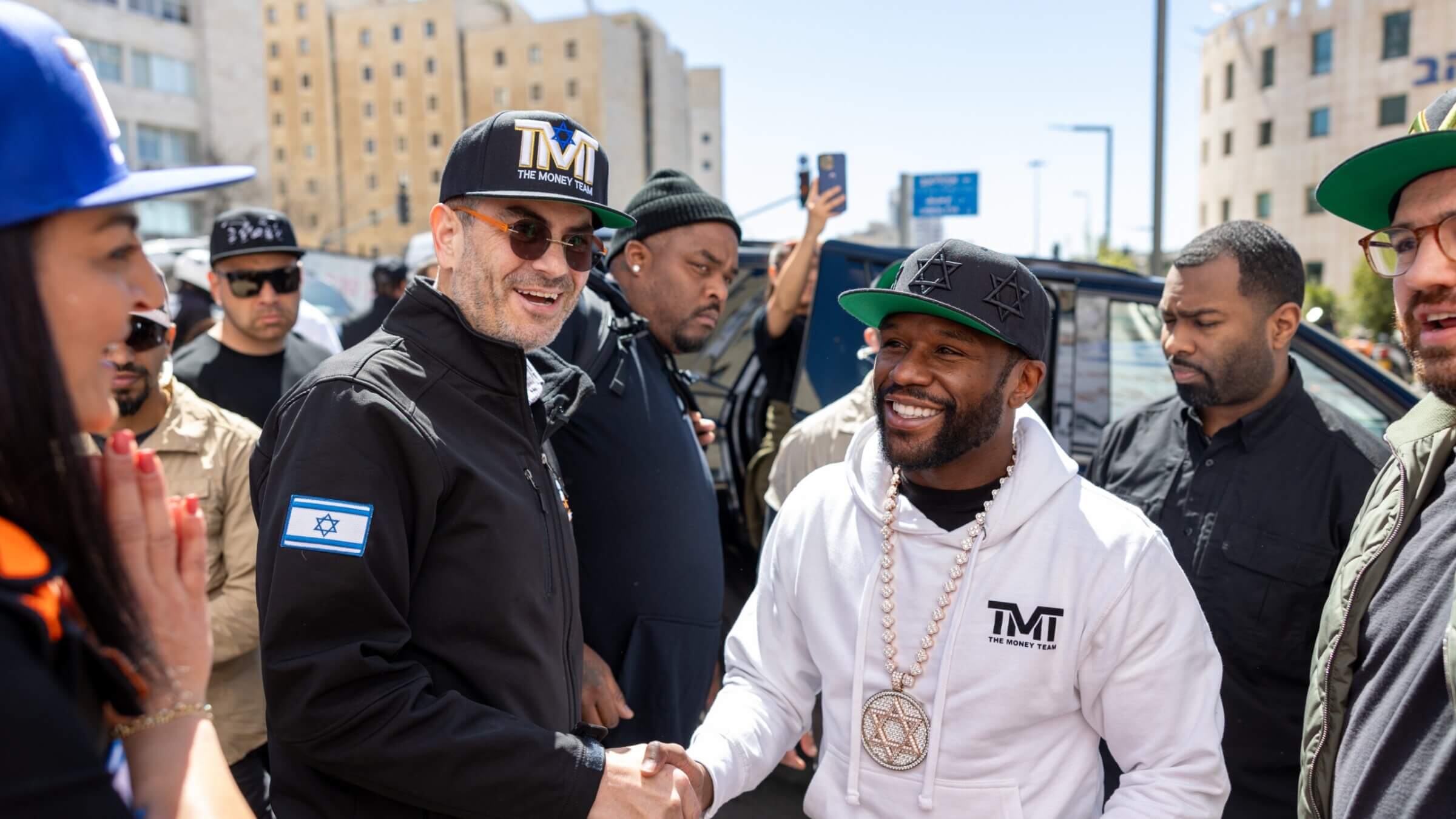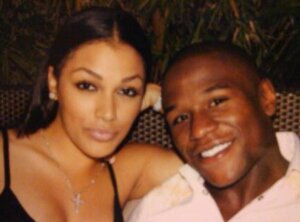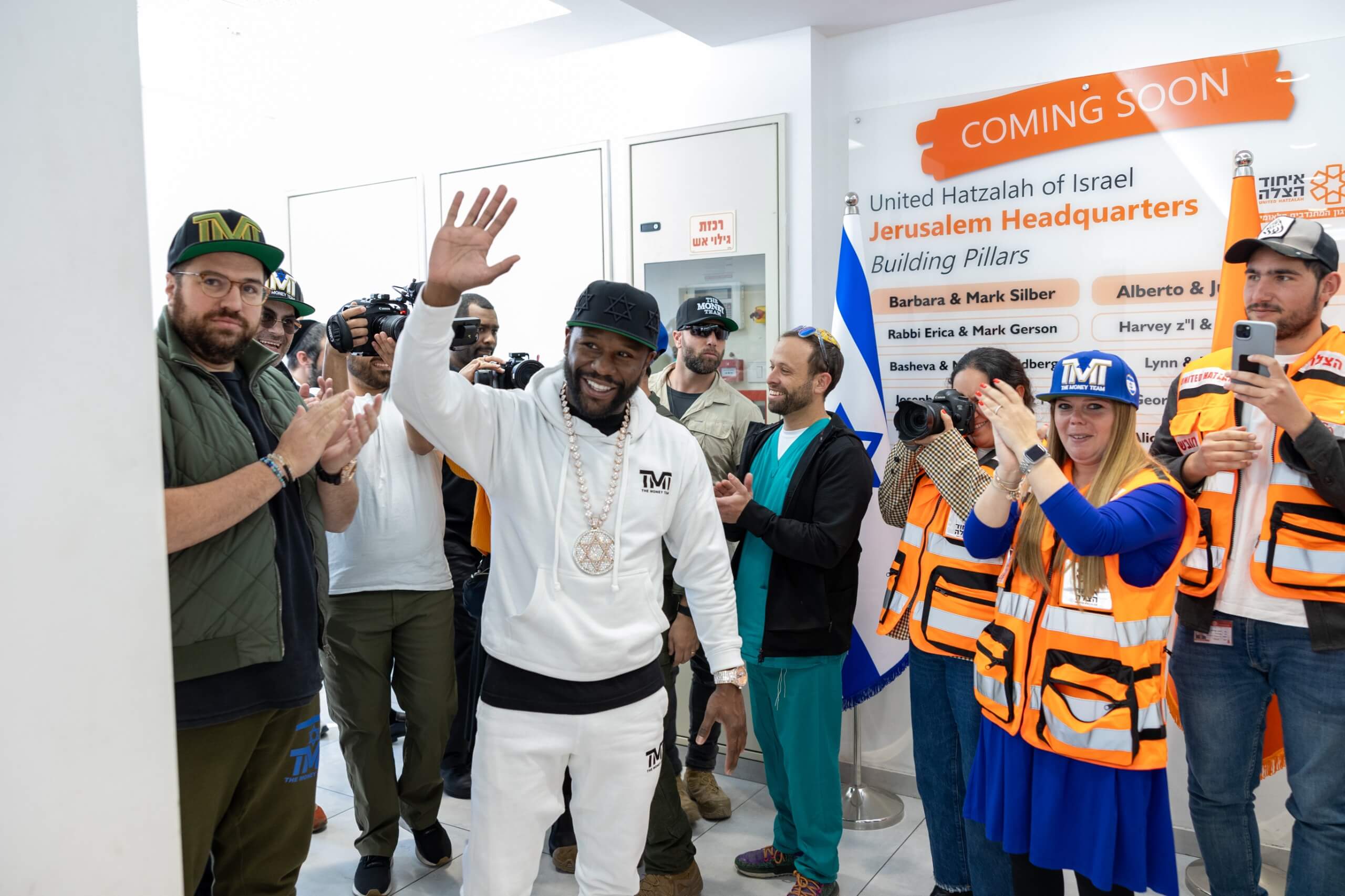Floyd Mayweather has a long record of domestic violence. Why are supporters of Israel embracing him?
The boxing champion — and recent ‘Champion of Israel’ award recipient — has never acknowledged wrongdoing in his cases. These Jewish groups don’t seem to mind.

Mayweather, right, with United Hatzalah president Eli Beer in Jerusalem on March 12. Courtesy of United Hatzalah
With the Western Wall glowing in the background and a 250-carat Star of David chain around his neck, Floyd Mayweather posed with Rabbi Steven Burg for a picture.
Mayweather, a 15-time boxing world champion who retired in 2017, has received a hero’s welcome in Israel this week, with Burg, the CEO of Aish, a Jewish outreach group, one of several luminaries feting him during his visit. Mayweather isn’t Jewish, but he has been as visible and charitable as any Jewish celebrity in his support of Israel since Oct. 7.
Mayweather’s activism has grown more noticeable as support for Israel has plummeted during Israel’s war against Hamas, especially in the entertainment industry. His trip to Israel stands in stark contrast to the many Hollywood celebrities who wore ceasefire pins to the Academy Awards.
But someone familiar with Mayweather’s background might be surprised to see Jewish leaders embracing him for standing against hate. As he racked up world championships in a 22-year career, along with a fortune some estimate is worth more than $1 billion, Mayweather also developed a reputation for violence against women. He pleaded guilty to charges related to such violence in multiple instances and served time in jail, but never apologized for wrongdoing. Instead, he has maintained that the absence of photos of his victims’ injuries proves his innocence.
So how are the Jewish organizations honoring Mayweather squaring his violent past with their missions? The answer appears to be that they aren’t. Rather, they’re ignoring it entirely, as Mayweather touts his support for Israel and lavishes them with donations.
Take, for example, American Friends of Magen David Adom, which awarded Mayweather with a “Champion of Israel” prize, along with a bedazzled custom first-responder vest, after he donated some “medicycles” — motorcycles for emergency response — to the organization late last year. AFMDA fundraises for Magen David Adom, the national ambulance service and blood bank that is Israel’s official representative to the International Red Cross.
In a statement Wednesday, AFMDA chief marketing officer Robert Rosenthal did not address the Forward‘s questions about Mayweather’s domestic violence record. “Mr. Mayweather’s contributions have played a role in saving lives, and we are grateful for that — as are the families of the Israelis whose loved ones benefited from the medical supplies, ambulances, and medicycles he helped make possible,” Rosenthal said.
Other organizations, asked to explain why they chose to honor a person with such a background, answered similarly, or declined to respond.
It’s not just Jewish organizations praising Mayweather. He’s also been characterized as a mensch in Jewish online spaces.
“He has put everything on the line for the Jewish people, so let’s all show him our support and give him a big thank you!” wrote Rabbi Shmuel Reichman to his more than 20,000 followers on X (formerly Twitter). The post received more than 5,000 likes. (Reichman did not respond to a request for comment.)
A representative for Mayweather did not respond to a request for comment.
A history of violence against women

Mayweather has an extensive record of convictions related to domestic violence.
The first recorded incident occurred in 2001, when Mayweather allegedly punched Melissa Brim, the mother of his daughter, Iyanna, in the neck during an argument over child support at a Las Vegas mall. He later accepted a plea bargain in which he pleaded guilty to two counts of domestic violence.
In 2003, Mayweather was accused of punching two women — friends of Josie Harris, the mother of three of his five children — at a Las Vegas nightclub. He received a suspended sentence after being convicted of two counts of battery.
In 2005, Mayweather stood trial for felony battery after allegedly punching and kicking Harris and dragging her out of his car. After Harris changed her story on the witness stand, saying she lied to police about the fight and Mayweather’s history of abuse, Mayweather was acquitted.
In 2010, Mayweather, who was no longer in a relationship with Harris, hit her in the back of the head and threatened to hurt his children if they called the police, according to an arrest report. Mayweather and Harris’ son Koraun, then 10 years old, told Las Vegas police he saw Mayweather hit and kick Harris. Mayweather, who said he was trying to restrain Harris, pleaded guilty to misdemeanor domestic assault and harassment and was sentenced to 90 days in jail. He served two months.
In 2014, Mayweather’s ex-girlfriend, Shantel Jackson, accused him in civil court of holding her at gunpoint and choking her. She later dropped the lawsuit.
In interviews, Mayweather has often used the lack of video of the incidents or photos of the victims’ injuries to assert his innocence. But as Deadspin reported in 2015, police reports indicate that pictures of the victims’ injuries were taken at the scene, but the city of Las Vegas — which made untold millions from every Mayweather fight — has either destroyed them or refuses to release them.
A staunch ally

The roots of Mayweather’s connection to Israel are unclear, but date to long before Oct. 7. In 2014, he began selling Star of David hats on his “The Money Team” website — a design he wore to the Western Wall this week. He visited Israel in 2022, and toured the Aish headquarters in Jerusalem on the trip.
He is apparently close with Jona Rechnitz, a Jewish real estate developer who admitted in 2016 to helping broker a bribe to ex-New York City jails union leader Norman Seabrook. (Rechnitz apologized for “criminal” behavior in a 2019 sentencing hearing.) Appearing in a Mayweather tribute video, Rechnitz said the boxer took him to Israel for his 40th birthday. “We had such an awesome trip — it was our whole entourage, 40, 50 people,” Rechnitz said.
Rechnitz could not be reached for comment.
Mayweather’s support for Israel, little known before Oct. 7, took off after the Hamas attacks.
In the days following the attacks, which killed more than 1,100 people, Mayweather posted several times on Instagram in support of Israel. His Oct. 9 post, a photo from the 2022 trip of him overlooking the Western Wall, was liked more than 400,000 times on the platform.
“I stand with Israel against the Hamas terrorists,” he wrote in the accompanying caption. “Hamas do not represent the people of Palestine but are a terrorist group that are attacking innocent lives! I stand for all humans and wish for the safe return of all Americans and Israelis and any human that were kidnapped as hostages during these horrific war crimes. This is not a time for politics. This is a time for safety first and foremost. God Bless America. God Bless Israel. God Bless Human Kind!”
A few days later, he chartered his private jet to send 5,000 pounds of emergency supplies to Israel, with the help of Rechnitz, David Rubin (a Jewish financier who pleaded guilty to fraud charges in 2010) and students from Orthodox Jewish schools in Los Angeles. Mayweather sold custom Israel hats as a fundraiser for Leket, an Israeli food bank. And he took to the streets with the Los Angeles Jewish community in a pro-Israel march on Oct. 15.
Mayweather’s philanthropy earned him plenty of fans in the Jewish world, and his trip to Israel this week was a chance for them to show their appreciation. United Hatzalah, an Israeli emergency response organization, draped three-story banners with Mayweather’s picture and logo above the entrance to their headquarters on the occasion of his visit. The organization’s president, Eli Beer, wore a “The Money Team” hat as he guided Mayweather through the building. He later gave Mayweather the “Lifesaving Award” for his contributions, along with a custom motorcycle helmet and Hatzalah vest.
“It was an honor for us to host the incredible Floyd Mayweather,” Beer told The Jerusalem Post afterward.
But United Hatzalah evaded questions about Mayweather’s criminal record. In a statement to the Forward, spokesperson Elias Romano said, “United Hatzalah condemns all acts of violence toward any individual. The organization is dedicated to saving lives, with 7,000 volunteers working daily across Israel to provide lifesaving treatment to individuals in need.
“Mr. Mayweather has dedicated time and resources to ensure Israelis receive vital medical equipment during a very difficult time, and gave support to our volunteers through this traumatic period, many of whom saved lives under fire on Oct. 7. For this selfless act, we chose to honor him.”
Don’t ask, don’t tell
Perhaps given the wealth of Mayweather’s contributions, or the rarity of support for Israel from non-Jewish celebrities these days, Jewish groups may have been willing to overlook Mayweather’s history.
This week, Burg, the Aish rabbi, gave Mayweather the “Champion For Israel” award, whose trophy — a glass display case containing a kippah with Mayweather’s logo on it — commends his “unwavering support and courage.”
Burg told The Jerusalem Post that Mayweather’s support holds “significant weight” because he is a famous athlete, adding, “We need to embrace those who stand strong behind Israel.”
It is not the first time Burg has willingly associated with a public figure besmirched by scandal. In 2020, he was one of several rabbis to write a letter to former President Donald Trump seeking a pardon for Elliot Broidy, a Jewish philanthropist who illegally paid millions to lobby federal officials to drop one of the largest embezzlement investigations in the history of the Justice Department.
Burg did not respond to requests for comment.
It’s true that Mayweather has remained generally popular in the public eye in spite of his criminal record. When he’s spotted sitting courtside at NBA games, broadcasters highlight his attendance like any other celebrity’s. Boxing does not have the same organizational structure as other professional sports, which means Mayweather has never faced a league fine, much less a suspension, for his actions. And maybe fans of violent sports are more willing to forgive athletes whose violence spills outside the arena.
But it’s also true that Mayweather’s history of violence against women is well-documented and well-known. And while many Jews lauded him on social media, others expressed disbelief.
“In a world of Jonathan Glazers, be a Floyd Mayweather,” one Jewish account posted on X, referring to The Zone of Interest director’s controversial Oscars speech condemning the war.
“How are people supposed to do that? Forget how to read and try to kill their wives?” was one response.















